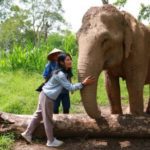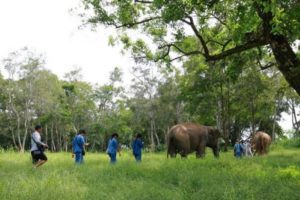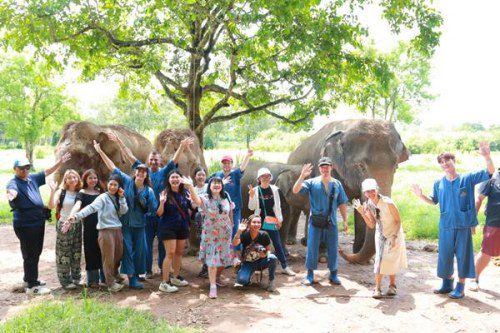 Elephants hold an integral role in Thai culture and history, symbolizing the country’s royal heritage and resilience. These majestic creatures have long life spans, and their deep connection to Thai history, including the nation’s fight for independence, has made them a symbol of strength. Notably, elephants were deployed in warfare, as seen in the legendary duel between King Naresuan and the Crown Prince of Burma, Myingyi Swa. This historical event marks a significant triumph in Thai history, liberating the country from Burmese rule.
Elephants hold an integral role in Thai culture and history, symbolizing the country’s royal heritage and resilience. These majestic creatures have long life spans, and their deep connection to Thai history, including the nation’s fight for independence, has made them a symbol of strength. Notably, elephants were deployed in warfare, as seen in the legendary duel between King Naresuan and the Crown Prince of Burma, Myingyi Swa. This historical event marks a significant triumph in Thai history, liberating the country from Burmese rule.
During the reign of King Rama IX, elephants were cherished as royal animals and became symbols of national representation in international relations. They have been sent abroad for missions and ceremonies, further emphasizing their diplomatic significance.
Recently, however, challenges have arisen concerning the well-being of these revered creatures. Domesticated elephants, led by their mahouts (handlers), often need to venture into urban areas to earn a living. They sell food to elephant enthusiasts, but this has led to incidents of mistreatment and accidents. The tourism industry has also negatively impacted elephants, leading to displacement from their natural habitats and exploitative practices.

To address these issues, various foundations have established elephant conservation projects. These initiatives encourage responsible tourism, allowing elephants to roam freely and interact with visitors without participating in unnatural activities. Notably, the “Anantara Golden Triangle Elephant Camp & Resort,” run by the Golden Triangle Asian Elephant Foundation, offers a sanctuary for over 20 elephants. The camp’s objective is to mitigate the issues faced by urban elephants and to provide a healthier, more natural lifestyle for them.
During our visit, we were introduced to a herd of elephants during a forest walk. Our group included five elephants, with the youngest being a three-year-old named “Chok Phet,” and the oldest, a 65-year-old named “Boonma.” Despite our initial apprehension, we were moved by their gentle interaction with us, and their willingness to follow their mahouts’ commands. The experience left a profound impression of the elephants’ intelligence, friendliness, and authenticity, making us eager for a return visit.
Written By: Prakaidown Baengsuntia

